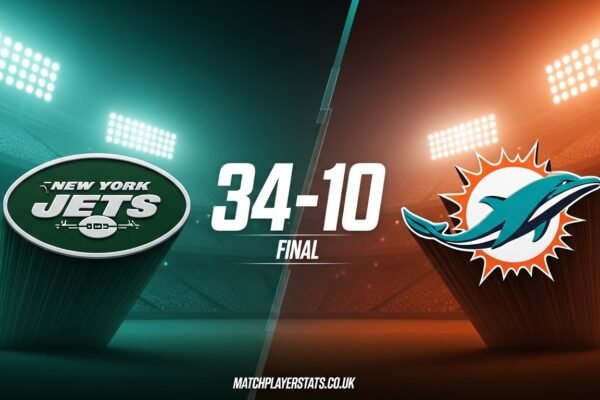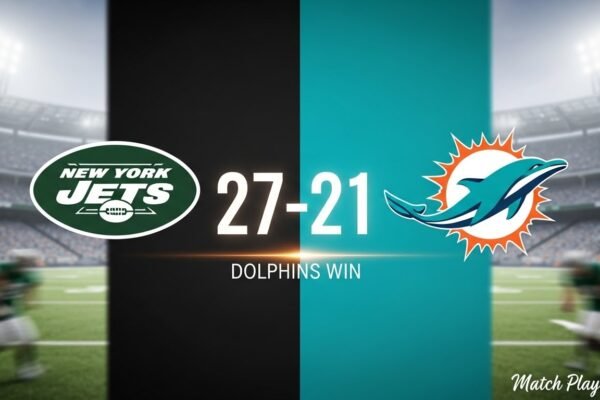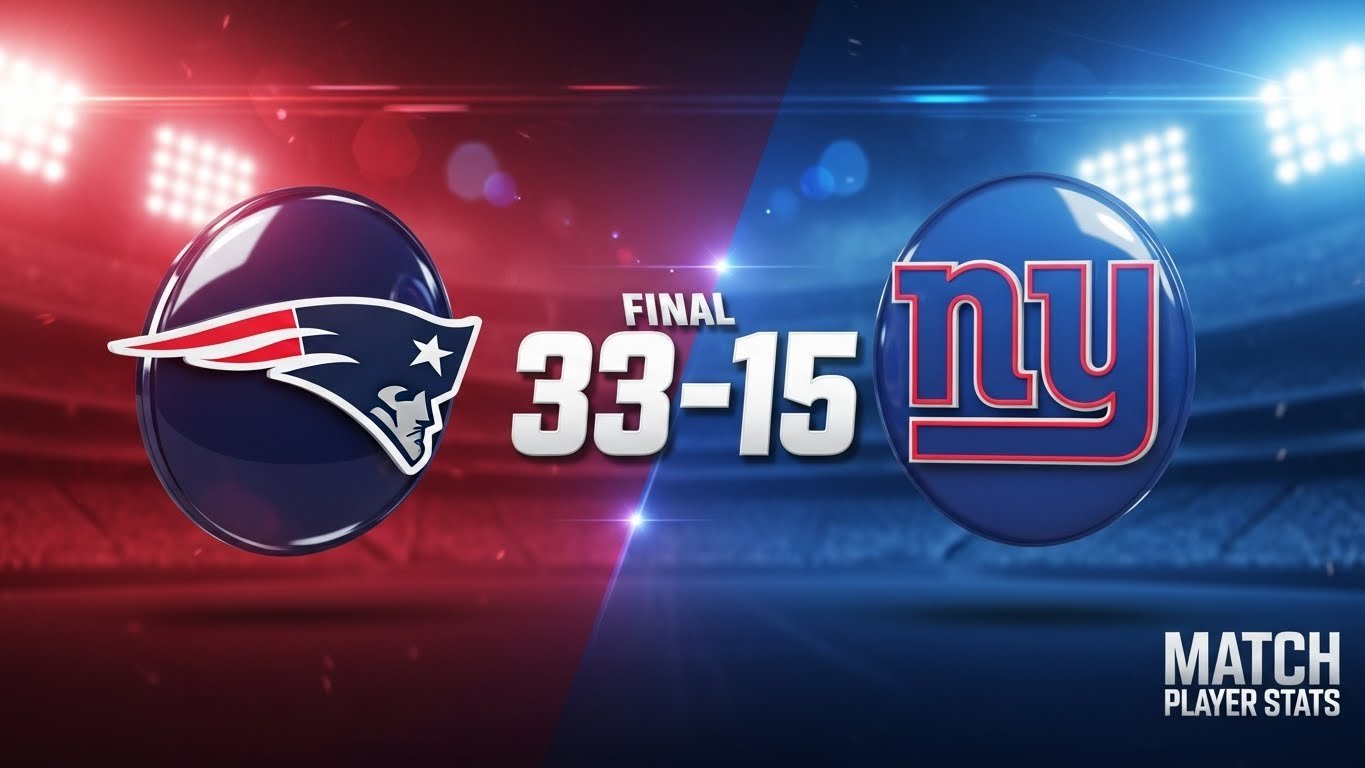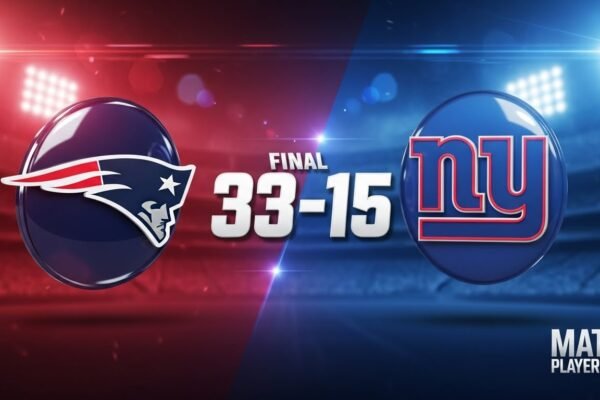
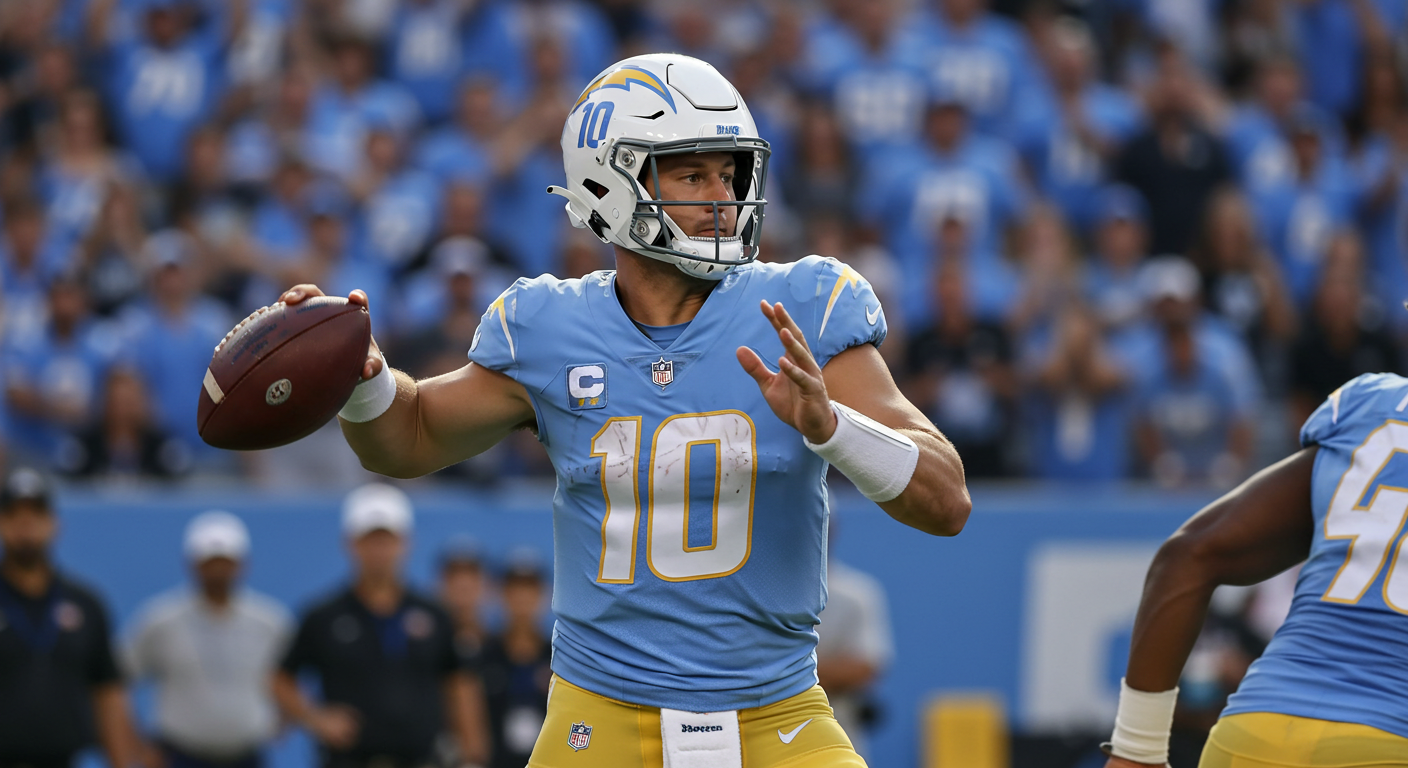
Las Vegas Raiders vs Los Angeles Chargers Match Player Stats (Jan 5, 2025)
The Los Angeles Chargers booked their playoff ticket with a commanding 34-20 victory over the Las Vegas Raiders at Allegiant Stadium on January 5, 2025. With 61,352 fans witnessing the season finale, the Chargers improved to 11-6 and claimed the AFC’s fifth seed, while the Raiders finished a disappointing 4-13.
Here are the complete Las Vegas Raiders vs Los Angeles Chargers match player stats that explain how Jim Harbaugh’s squad swept their division rivals for the first time since 2018.
Table of Contents
Team Statistics: Chargers Control Every Phase
The raw numbers from this AFC West clash demonstrate complete Chargers dominance. Los Angeles held the ball for 38 minutes and 58 seconds compared to Las Vegas managing just 21:02. When you control nearly two-thirds of the game clock, you’re dictating terms to your opponent.
| Statistic | LA Chargers | Las Vegas Raiders |
|---|---|---|
| Total Yards | 473 | 264 |
| Passing Yards | 336 | 225 |
| Rushing Yards | 137 | 39 |
| First Downs | 26 | 16 |
| Third Down Conversion | 7/14 (50%) | 2/9 (22.2%) |
| Fourth Down Conversion | 1/1 (100%) | 1/2 (50%) |
| Turnovers | 0 | 1 |
| Total Plays | 72 | 48 |
| Penalties | 7 for 40 yards | 3 for 28 yards |
The play count differential stands out immediately. Running 24 more offensive plays than your opponent usually translates to victory, and Sunday was no exception. The Raiders’ 39 rushing yards rank among the worst single-game performances by any NFL team this season. For context, most high school teams manage more ground production.
Quarterback Comparison: Herbert Excellence vs O’Connell Struggles
Justin Herbert delivered exactly what you want from your franchise quarterback in a must-win game. His stat line reads like a playoff preview: 28 completions on 36 attempts (77.8%), 346 yards, two touchdowns, zero interceptions, and a 125.2 passer rating.
| QB Stats | Justin Herbert | Aidan O’Connell | Desmond Ridder |
|---|---|---|---|
| Completions/Attempts | 28/36 | 24/34 | 1/2 |
| Completion % | 77.8% | 70.6% | 50% |
| Passing Yards | 346 | 214 | 11 |
| Yards/Attempt | 9.6 | 6.3 | 5.5 |
| TD/INT | 2/0 | 2/1 | 0/0 |
| Passer Rating | 125.2 | 94.5 | 66.7 |
| Rushing | 4 for 42 yards | 4 for 13 yards | None |
| Sacks Taken | 1 for 10 yards | 0 | 0 |
| Play Action Success | 12/12, 176 yards, 1 TD | Not tracked | N/A |
Herbert’s 9.6 yards per attempt places him in elite company for Week 18 performances. His perfect 12-for-12 on play-action passes (176 yards, one touchdown) demonstrates how effectively the Chargers used their rushing attack to set up the passing game. When defenses have to respect your run game, play-action becomes lethal.
O’Connell’s 6.3 yards per attempt ranks in the bottom five among all starting quarterbacks in Week 18. That number typically indicates an offense relegated to checkdowns and short completions. NFL teams averaging under 7.0 YPA win just 31% of their games historically.
The game’s momentum shifted permanently when linebacker Daiyan Henley intercepted O’Connell with 37 seconds left in the second quarter. The Raiders led 10-9 at that moment. Henley read the short pass intended for Alexander Mattison perfectly, giving Los Angeles possession at the Las Vegas 30-yard line. Four plays later, DJ Chark hauled in a 6-yard touchdown, and the successful two-point conversion gave the Chargers a 17-10 halftime lead they never relinquished.
Receiving Statistics: Career Days and Milestones
Quentin Johnston picked the perfect time for his best professional performance. The second-year receiver caught 13 of 14 targets for 186 yards, all career highs. His 92.9% catch rate on 14 targets demonstrates the trust Herbert has developed in him heading into the playoffs.
| Player | Team | Receptions | Targets | Yards | TDs | Longest |
|---|---|---|---|---|---|---|
| Quentin Johnston | LAC | 13 | 14 | 186 | 0 | 39 |
| Jakobi Meyers | LV | 9 | 10 | 123 | 1 | 25 |
| Ladd McConkey | LAC | 5 | 8 | 95 | 0 | 47 |
| Brock Bowers | LV | 4 | 9 | 50 | 1 | 21 |
| Will Dissly | LAC | 5 | 6 | 42 | 1 | 15 |
| Tre Tucker | LV | 3 | 4 | 24 | 0 | 11 |
| Michael Mayer | LV | 4 | 4 | 21 | 0 | 11 |
| J.K. Dobbins | LAC | 3 | 3 | 12 | 0 | 9 |
| Alexander Mattison | LV | 4 | 5 | 11 | 0 | 6 |
| DJ Chark | LAC | 1 | 3 | 6 | 1 | 6 |
Jakobi Meyers achieved a personal milestone despite the loss, surpassing 1,000 receiving yards (1,027 total) for the first time in his six-year career. The former undrafted free agent has developed into Las Vegas’s most reliable target, though his 25-yard touchdown where he sold a perfect double move proved to be fool’s gold as the Raiders couldn’t sustain offensive success.
Ladd McConkey’s 5 catches for 95 yards broke the NFL rookie record for consecutive games with 50+ receiving yards, previously held by Odell Beckham Jr. The Chargers have found two young receivers ready for playoff football.
Brock Bowers wrapped up a phenomenal rookie campaign with 1,194 receiving yards after his 4-catch, 50-yard performance. His late touchdown with 25 seconds remaining only affected the final margin.
DJ Chark caught just one pass all game, but timing beats volume. His 6-yard touchdown reception immediately following Henley’s interception transformed a 10-9 deficit into a 17-10 halftime lead after McConkey hauled in the two-point conversion.
Rushing Attack Analysis
The ground game disparity explains why one team controlled the clock while the other watched from the sideline.
| Player | Team | Attempts | Yards | Average | TDs | Long |
|---|---|---|---|---|---|---|
| J.K. Dobbins | LAC | 18 | 63 | 3.5 | 0 | 10 |
| Justin Herbert | LAC | 4 | 42 | 10.5 | 0 | 41 |
| Hassan Haskins | LAC | 12 | 33 | 2.8 | 1 | 12 |
| Alexander Mattison | LV | 6 | 20 | 3.3 | 0 | 11 |
| Aidan O’Connell | LV | 4 | 13 | 3.3 | 0 | 9 |
| Chris Collier | LV | 2 | 6 | 3.0 | 0 | 4 |
| Derius Davis | LAC | 1 | -1 | -1.0 | 0 | -1 |
J.K. Dobbins grinding out 63 yards on 18 carries might not seem impressive at 3.5 yards per attempt, but those carries moved chains and kept Las Vegas’s defense on the field throughout the game.
Herbert’s 41-yard scramble in the fourth quarter changed everything. Facing pressure on third down, he escaped the pocket and raced down the sideline, setting up Will Dissly’s 2-yard touchdown reception two plays later. Mobile quarterbacks create problems defenses can’t scheme away.
Hassan Haskins delivered the final blow with his 2-yard touchdown run at the 3:38 mark of the fourth quarter, capping a 12-play, 81-yard drive that consumed over seven minutes.
Las Vegas’s 39 team rushing yards on 12 attempts (3.3 average) made them completely one-dimensional. NFL teams averaging under 3.5 yards per carry win just 18% of their games since 2020. When Mattison’s your leading rusher with 20 yards, defensive coordinators sleep well knowing they can pin their ears back and rush the passer.
Defensive Performances and Key Plays
Robert Spillane’s 16 tackles led all defenders, but that statistic reflects how often Las Vegas’s defense was on the field. The unit defended 72 plays over nearly 40 minutes, an exhausting workload that eventually broke them.
| Player | Team | Total Tackles | Solo | Sacks | TFL | INT | Pass Deflections |
|---|---|---|---|---|---|---|---|
| Robert Spillane | LV | 16 | 6 | 0 | 0 | 0 | 0 |
| Decamerion Richardson | LV | 10 | 5 | 0 | 0 | 0 | 0 |
| Isaiah Pola-Mao | LV | 9 | 5 | 0 | 1 | 0 | 0 |
| Divine Deablo | LV | 7 | 2 | 0 | 1 | 0 | 0 |
| Tarheeb Still | LAC | 7 | 5 | 0 | 1 | 0 | 0 |
| Tre’von Moehrig | LV | 7 | 2 | 0 | 0 | 0 | 0 |
| Troy Dye | LAC | 6 | 4 | 0 | 0 | 0 | 0 |
| Daiyan Henley | LAC | 5 | 2 | 0 | 0 | 1 | 1 |
| Jack Jones | LV | 5 | 3 | 0 | 0 | 0 | 1 |
| Adam Butler | LV | 4 | 3 | 1 | 1 | 0 | 0 |
| Derwin James Jr. | LAC | 3 | 2 | 0 | 1 | 0 | 1 |
Daiyan Henley earned the game ball with his first career interception. Reading O’Connell’s eyes perfectly, he jumped the route intended for Mattison and returned it 4 yards to the Las Vegas 30. The timing couldn’t have been better: 37 seconds before halftime with the Raiders protecting a 10-9 lead. That single play swung the game’s momentum permanently.
Adam Butler recorded the game’s only sack, but one sack in 60 minutes won’t disrupt any quarterback’s rhythm. The lack of pass rush allowed Herbert to operate comfortably in the pocket all game.
Derwin James Jr. delivered when it mattered most, breaking up a fourth-down pass intended for Brock Bowers in the end zone during the fourth quarter. That stop essentially ended any Raiders comeback hopes.
Derius Davis fumbled once on special teams but recovered it himself, keeping the Chargers’ turnover count at zero.
Special Teams Impact
The hidden yardage battle often decides close games, though this one wasn’t particularly close after halftime.
Field Goal Efficiency
| Kicker | FG Made/Att | Distances | XP | Total Points |
|---|---|---|---|---|
| Cameron Dicker (LAC) | 4/5 | 33, 32, 49, 20 (made); 51 (missed) | 2/2 | 14 |
| Daniel Carlson (LV) | 2/2 | 40, 47 | 2/2 | 8 |
Cameron Dicker stayed busy, attempting five field goals due to the Chargers’ red zone struggles. His 51-yard miss early didn’t affect the outcome, as he connected from 33, 32, 49, and 20 yards when needed.
Punting Disparity
| Punter | Team | Punts | Total Yards | Average | Long | Inside 20 | Touchbacks |
|---|---|---|---|---|---|---|---|
| AJ Cole | LV | 3 | 180 | 60.0 | 62 | 2 | 1 |
| JK Scott | LAC | 1 | 47 | 47.0 | 47 | 0 | 0 |
This comparison speaks volumes. Las Vegas punted three times while Los Angeles punted once. Cole’s 60-yard average and 62-yard bomb couldn’t overcome his offense’s inability to sustain drives. Scott’s single 47-yard punt came early when the Chargers were still finding their rhythm.
Return Game
| Return Type | Player | Team | Returns | Yards | Average | Long | TDs |
|---|---|---|---|---|---|---|---|
| Kickoff | Chris Collier | LV | 1 | 39 | 39.0 | 39 | 0 |
| Kickoff | Dylan Laube | LV | 1 | 19 | 19.0 | 19 | 0 |
| Punt | Derius Davis | LAC | 2 | 10 | 5.0 | 10 | 0 |
Collier’s 39-yard return gave Las Vegas their best starting field position, but they couldn’t capitalize. Davis played it safe with his punt returns, securing possession rather than hunting for big plays with the lead.
Quarter-by-Quarter Scoring Progression
First Quarter (3-3)
The opening period featured cautious probing from both teams. Daniel Carlson struck first with a 40-yard field goal at 2:46 following a 7-play, 37-yard drive. The Chargers went three-and-out on their opening possession, then saw Cameron Dicker miss from 51 yards on their second drive. Dicker redeemed himself with a 33-yarder with 11 seconds left, tying the game.
Second Quarter (17-10 LAC)
Jakobi Meyers gave Raiders fans brief hope with a spectacular 25-yard touchdown at 13:08. He sold a double move that left the Chargers secondary grasping at air. Los Angeles responded methodically with field goals from 32 and 49 yards, but still trailed 10-9 late. Then came the game’s defining sequence: Henley’s interception at 0:37, Chark’s 6-yard touchdown at 0:09, and McConkey’s two-point conversion catch. Eight points in 28 seconds transformed the game.
Third Quarter (20-13 LAC)
Los Angeles received the second-half kickoff and immediately imposed their will. They orchestrated a soul-crushing 13-play, 61-yard drive that consumed 7 minutes and 50 seconds. The Raiders defense held in the red zone, forcing a 20-yard Dicker field goal, but spending nearly eight minutes on defense to start the half deflated Las Vegas. Carlson’s 47-yard field goal kept it technically a one-score game at 20-13.
Fourth Quarter (34-20 LAC)
Herbert’s 41-yard scramble at 14:22 energized the Chargers and set up Dissly’s 2-yard touchdown at 13:14. After James broke up the fourth-down pass to Bowers, Los Angeles delivered the knockout: a 12-play, 81-yard drive consuming 7:12, ending with Haskins’ 2-yard touchdown run. Bowers caught a meaningless 12-yard touchdown with 25 seconds left.
Red Zone Efficiency: The Chargers’ Achilles Heel
Despite dominating statistically, Los Angeles struggled to finish drives with touchdowns:
| Team | Red Zone Trips | Touchdowns | Field Goals | Efficiency | Points Left |
|---|---|---|---|---|---|
| LA Chargers | 6 | 3 | 3 | 50% | 9 |
| Las Vegas | 2 | 1 | 1 | 50% | 3 |
The Chargers’ 50% red zone touchdown rate would concern any coaching staff heading into the playoffs. Against elite defenses, settling for three instead of seven often determines outcomes. They left nine points on the field by kicking field goals instead of scoring touchdowns.
Las Vegas only reached the red zone twice all game, a damning indictment of their offensive ineffectiveness. One trip resulted in Meyers’ touchdown, the other in Carlson’s field goal.
Historical and Playoff Context
The Chargers’ sweep marks their first season series victory over the Raiders since 2018. According to Pro Football Reference, the all-time series now stands at 69-68-2 in Los Angeles’s favor.
The statistical dominance ranks among the most lopsided in recent rivalry history. The 209-yard total offense differential and 17:56 time of possession advantage represent the largest margins in any Raiders-Chargers game since 2016. CBS Sports analysis highlighted how the Chargers’ control of both trenches made this less competitive than the 14-point margin suggests.
Individual Achievements and Milestones
Several players reached significant career markers:
Jakobi Meyers – Crossed 1,000 receiving yards for the first time, finishing at 1,027. The sixth-year veteran proved undrafted players can become legitimate NFL weapons.
Brock Bowers – Concluded his rookie season with 1,194 receiving yards, falling just 6 yards short of 1,200. His 112 receptions set the Raiders’ rookie record.
Ladd McConkey – Broke Odell Beckham Jr.’s rookie record with his seventh consecutive game of 50+ receiving yards. The Chargers found a steal in the draft.
Quentin Johnston – Set career highs in receptions (13), targets (14), and yards (186). His emergence gives Herbert another legitimate weapon for the upcoming playoff matchup.
Daiyan Henley – Recorded his first career interception at the perfect moment, changing the game’s trajectory forever.
Why the Raiders Lost: Three Critical Failures
1. Non-Existent Running Game
Thirty-nine rushing yards won’t beat anyone in the NFL. The Raiders’ inability to establish any ground presence made them predictable. Defensive coordinators dream about facing teams that can only throw. The Chargers knew what was coming every play.
2. Third Down Disasters
Converting just 2 of 9 third downs (22.2%) guarantees offensive futility. You can’t sustain drives converting one of every four third downs. The Chargers’ 50% conversion rate kept drives alive and exhausted the Raiders defense.
3. The Worst Possible Turnover
O’Connell’s interception with 37 seconds left in the half, protecting a 10-9 lead, ranks among the most costly turnovers of the entire Raiders season. The immediate eight-point swing changed everything. Games often hinge on one or two plays; this was clearly one.
Chargers’ Keys to Victory
Balanced Offensive Attack
The 336 passing yards complemented by 137 rushing yards kept Las Vegas guessing. When defenses must respect both run and pass, offensive coordinators have answers for everything.
Time of Possession Dominance
Holding the ball for nearly 39 minutes accomplishes multiple goals: your defense stays fresh, their defense gets tired, and you control the game’s pace. The Raiders ran just 48 plays to the Chargers’ 72.
Zero Turnovers
In a game where one turnover swung momentum decisively, the Chargers protected the ball perfectly. Herbert’s zero interceptions in a must-win game demonstrates elite quarterback play.
Fantasy Football and Betting Implications
For fantasy players, Johnston’s breakout provides a potential league-winner heading into the playoffs. His 13-186 line produced 31.6 PPR points. Herbert’s 28.34 fantasy points came without rushing touchdowns, suggesting even higher upside remains.
The Chargers covered as 4.5-point favorites, and the game stayed under the 41.5 total. The eight fourth-quarter points by Los Angeles after garbage time had begun rewarded those who took the over on team totals.
Final Analysis: Playoff Ready vs Season Over
The Las Vegas Raiders vs Los Angeles Chargers match player stats from January 5, 2025, document more than just a game; they chronicle two franchises heading opposite directions. The Chargers enter the playoffs with momentum, having swept their biggest rival while their young receivers emerged as legitimate threats. Justin Herbert’s combination of arm talent and mobility gives them a puncher’s chance against anyone.
The Raiders face an uncertain offseason. Head coach Antonio Pierce declined to discuss his job security postgame, and rightfully so after a 4-13 campaign. The quarterback position needs addressing immediately. O’Connell’s limitations were exposed against a playoff-caliber defense. In a division featuring Patrick Mahomes and Justin Herbert, adequate quarterback play guarantees last place.
Jim Harbaugh’s first season exceeded expectations with an 11-6 record and playoff berth. His ability to establish a physical identity while maximizing Herbert’s talents bodes well for the franchise’s future. The red zone inefficiency needs immediate attention, but having that as your biggest concern heading into the playoffs beats having no playoffs at all.
For Raiders fans, the season ended exactly how it went all year: not enough offense, too many mistakes, and watching division rivals celebrate on their field. The 39 rushing yards, 264 total yards, and 21:02 time of possession in a season finale encapsulate why change is necessary.
When referee Carl Cheffers signaled the end of regulation, he closed the book on two vastly different seasons. One team heads to Houston for wild-card weekend. The other heads to Cabo for vacation.


